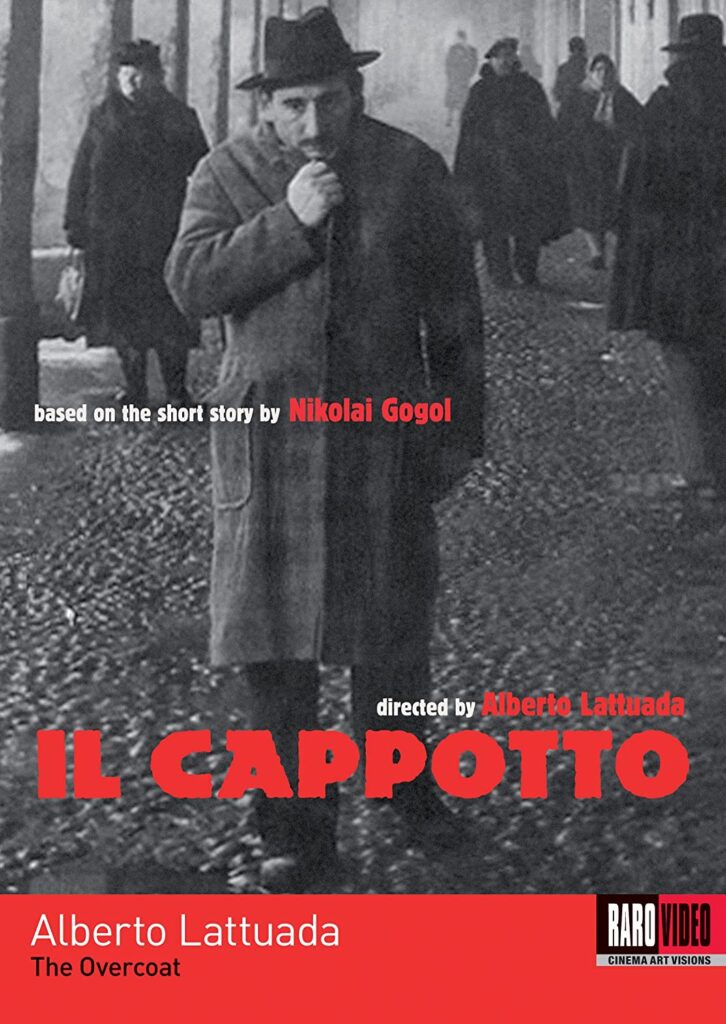
Made when the Italian Neorealist movement was still prominent, Alberto Lattuada’s The Overcoat sounds like a prime example of the genre — poor city clerk toils for years and years to save up enough money to purchase a coat, but only days later the coat is stolen and he’s left exposed to the harsh elements. Cursorily, there are thematic similarities to Vittorio De Sica’s quintessential Neorealist work Umberto D., released the same year in 1952, but Lattuada’s film is an entirely different breed — a curious blend of sharp bureaucratic satire, tragicomic character piece and surreal fantasy. With its instantly distinctive qualities, it’s a small wonder the film isn’t better known.
Based on a 19th Century short story by Nikolai Gogol and adapted here by seven screenwriters, The Overcoat stars an inimitable Renato Rascel as Carmine De Carmine, a mousy clerk at city hall, surrounded by arrogant bureaucratic boors convinced of their own self-importance. While the mayor (Giulio Stival) plans lavish receptions and municipal construction projects of dubious importance, De Carmine struggles to make it by on his own miniscule wage. His paper-thin coat has a giant hole in the back, and his aspirations to buy a new one far outpace the money he has stuffed in his mattress.
Lattuada doesn’t paint De Carmine as some kind of unrecognized hero — in some ways, he’s as oblivious as his higher-ups, just without the stench of unbridled avarice. A series of mistakes costs him his job, but he bumbles right back into it by inadvertently discovering a corrupt scheme, and the additional bonus sent his way is enough to purchase the long-awaited overcoat.
Rascel’s performance anchors the film, portraying a truly pathetic man whose fleeting successes aren’t the result of his own intelligence or the goodwill of humankind, but dumb luck that runs out soon enough. After donning the fur-lined overcoat, De Carmine is afforded a modicum of respect by his coworkers heretofore unseen, but it soon becomes clear there’s barely concealed laughter hiding behind the ostensible admiration.
At a New Year’s party, De Carmine finds a seeming moment of triumph in a waltz with a beautiful companion of the mayor’s (Yvonne Sanson), but he doesn’t seem to realize this is as good as it gets for a man in his lowly position — his casual farewell to the woman, in which he informs her he’ll be giving her a call later, is a perfect encapsulation of the tragicomic nature of the character. It’s funny, but also a little bit heartbreaking.
Lattuada’s pessimism at the nature of mankind seeps through the entire picture, but he maintains a comic edge that’s essential to the film’s success. A scene where De Carmine uses a variety of passers-by to keep his new coat out of the rain has a Chaplin-like grace to it, and when the film tips over into the ghostly surrealism of the finale, it achieves a lightly comic poignancy.
With seven screenwriters and a variety of tonal shifts, one might expect The Overcoat to be an uneven mishmash, but Latuada’s film is surprisingly coherent — a forgotten little non-neorealist masterpiece of the Italian Neorealist era.
The Raro Video DVD of the film presents a solid new transfer from the original 35mm negative and includes an audio commentary by scholar Flavio de Bernardinis, a video interview with filmmaker Angelo Pasquini and 25 minutes of silent rushes featuring deleted scenes from the film. The package also includes a booklet with several critical essays and appreciations of the film.